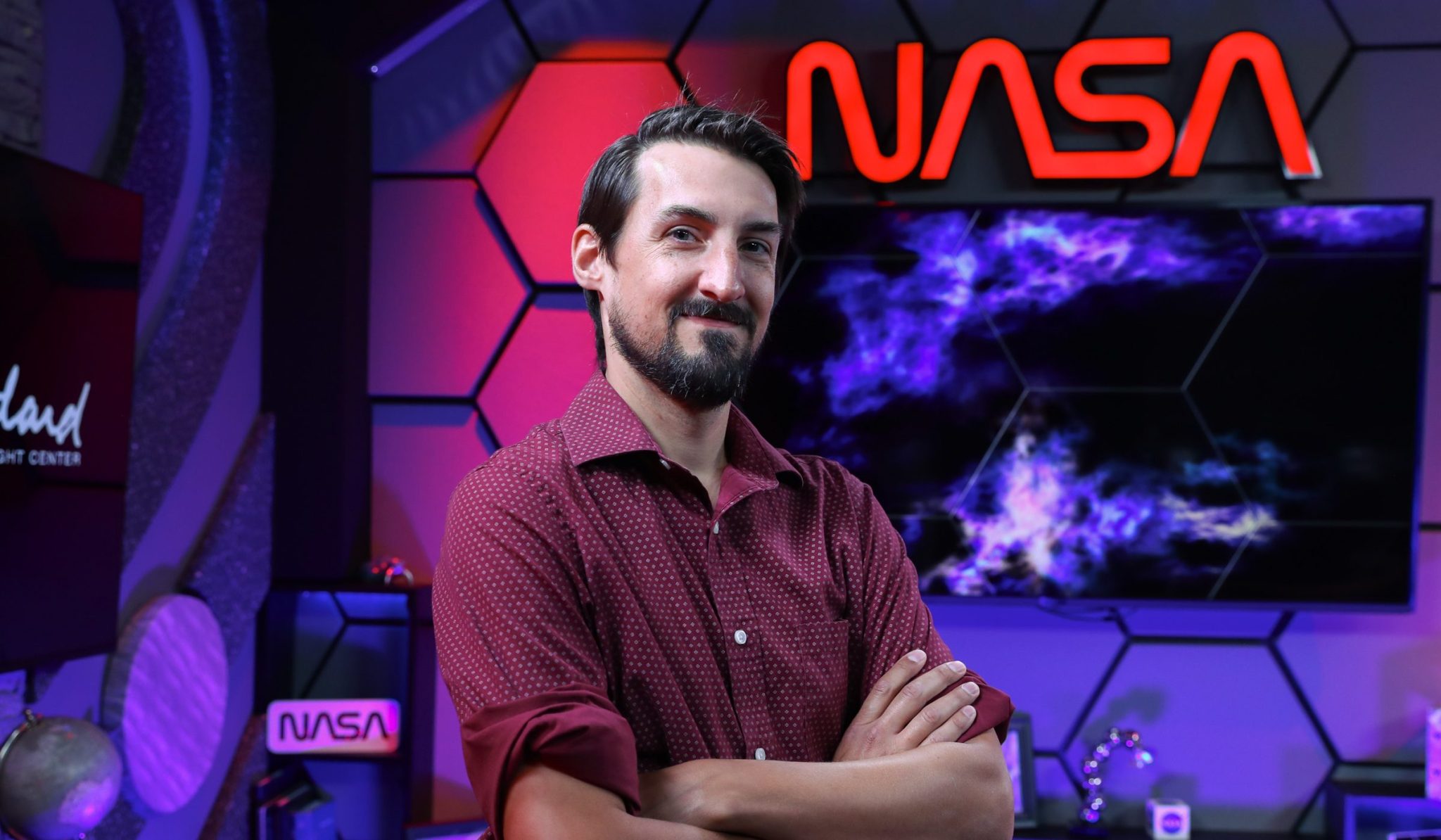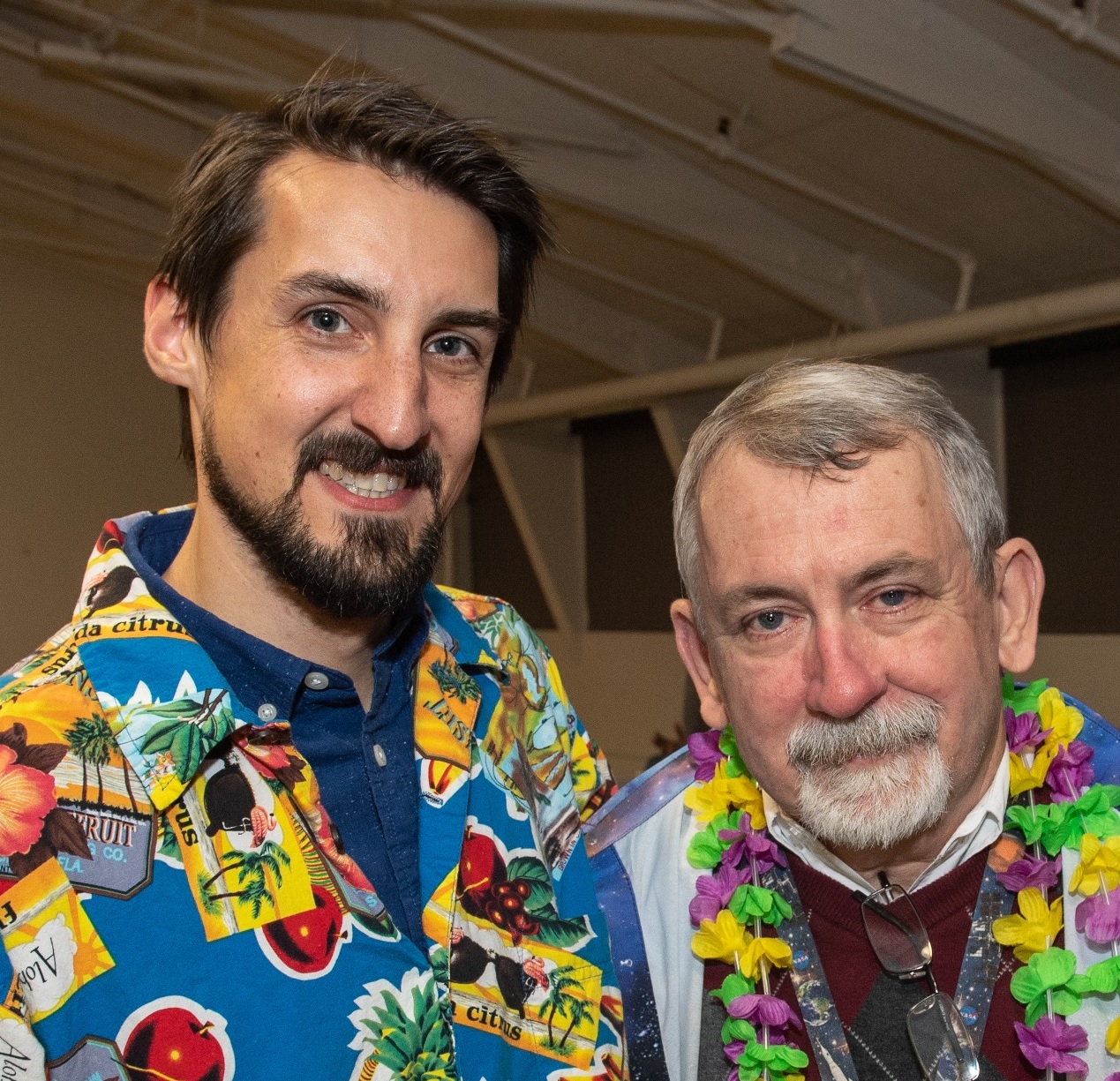News Chief Rob Garner shares NASA Goddard's story with the public, supporting writers and creators in the Office of Communications.
Name: Rob Garner
Title: News Chief
Formal Job Classification: Senior public affairs specialist
Organization: Office of Communications (Code 130)

What do you do and what is most interesting about your role here at Goddard?
I am responsible for helping take the great work going on at our center and sharing it with as many people as we can. My job is sort of like being an editor in chief. I try to set the tone for our storytelling and manage our publication schedule. Mostly I try to give our writers and other communicators the support they need to do their jobs - and then I try to get out of their way so they can do what they do best.
What is your educational background?
I have a B.A. in journalism from the University of Maryland, College Park, with a minor in astronomy, as well as a Master of Library Science degree focusing on archives, also from UMD.
Why did you want to be a journalist?
I sort of fell into the work that I am doing. In high school, I thought I would be a band director. I realized very quickly after high school that my enthusiasm for music did not align with my proficiency in it. Music remains an important hobby, but I needed to make a living doing something else.
I did not really enjoy writing until I got to college and had the opportunity to experience journalism. Tight writing, going straight to the source to get answers, accurate researching, it all appealed to me. I think journalism as a profession plays a critical role in ensuring an informed and functional society.
How did you come to work for Goddard?
After I graduated college, I worked weekends for a few months on the digital desk at WTOP radio, editing copy and updating their website. I was still looking for a fulltime gig, and I happened upon a newspaper classified for a position at Goddard. It called for a little bit of newswriting, a little bit of web editing, a little bit of science. Until that moment, I never imagined NASA could have a place for someone like me.
Goddard offered me a one-year fellowship in the Office of Communication (back then called Public Affairs) to do website editing for our Earth science team. The fellowship was renewed a few times, and eventually I became a general web editor, then also a social media editor, and eventually leader of the digital media team. In 2022, I became the news chief.
As news chief, what is your vision?
I take very seriously the part of NASA's 1958 charter that charges the agency not just with conducting cutting-edge research, but also with sharing our work with the broadest possible audience. We must also drive home why what we do matters. The first thing I look for when reviewing copy is how well the piece addresses the "why."
What makes a good science communicator?
Goddard has some 10,000 people, mostly researchers and engineers. Here, a successful science communicator is one who develops relationships among these different people and a deep understanding of their many projects. As communicators, we cannot do our jobs if we do not also have the trust of the people actually doing the science.
As a mentor, what is the one big piece of advice you give?
I tell our interns to jump in with both feet. So much of what we do and what we know cannot be found in any handbook or manual. So much of it is the institutional knowledge that each of us carries based on our own experiences.
Grab hold of the people who have the experience and take in as much as you can from them. Immersing in and embracing that Goddard culture is what will set apart a good colleague from a great one.
Everyone in the newsroom here knows that you are quite fond of the Associated Press (AP) Stylebook and the NASA Stylebook and Communications Manual. Can you please explain what they and why you are so fond of them?
One can think of AP style as an appendix or addendum to the dictionary, and the NASA style manual as an appendix or addendum to AP. The aim in having all of these mechanics standardized is to make it easier for the reader to read what you are writing. Even if one doesn't know the rules governing serial comma usage, most of us can tell when what we're reading is sloppy. Any time you force the reader to pause and review, there is a chance you will lose them. They may tune out and take their attention elsewhere.
These manuals lay out more than the mechanics of which states get abbreviated in what way, when to use semicolons, and when to use em dashes. They also give us guidelines about how to do our jobs, covering things like ethics, chain of command, and conflict resolution.
What do you enjoy best about your job?
My job is not just editing copy, fielding questions from reporters, or escorting groups for tours or documentary filming. I do enjoy all of that, but what I like most is that every day is different, and every day I learn something new. I love the variety of tasks and tactics that we use get our message out to the world. NASA plays a critical role in benefitting all of humanity by broadening our knowledge about the universe and our place in it. It's personally very meaningful to me to have even a small role in that mission. And I enjoy working with a really great group of people.
You said in high school you thought you would become a band director. Have you kept up with playing?
In my free time, I do still play trumpet. For almost 20 years, I have played in community orchestras that draw repertoire from video game soundtracks. The past 10 years, I've been with the Washington Metropolitan Gamer Symphony Orchestra (WMGSO), along with my wife, who plays the violin. This group - well over 100 of us - originated when we were all in college, and we have continued together since then. What makes our group special is that we still do a lot of the orchestration ourselves, meaning that you cannot hear our music anywhere else. We meet once a week and perform three or four times a year throughout the D.C. area. We even have an album out, with another on the way soon.
Can you please tell us about your dog rescue volunteer work?
Since 2018, my wife and I have been involved with a couple area animal rescues. We typically take in newly weaned puppies and keep them for the weeks or months it takes for them to find their forever homes. While they are in our care, we keep them safe, fed, warm, and loved. We also socialize them as much as possible. The organizations take care of finding them homes through weekly adoption events.
My wife and I have three dogs of our own, two of which are rescues from this group. We have fostered hundreds over the years. I lost count somewhere north of 250 - and counting. I think it is important for everyone to find a way to make the world a better place. This is our way of doing that.

Who would you like to thank for helping you?
That's a long list! I'm forever grateful to Goddard's executive producer, Wade Sisler, who saw something in babyface Rob Garner, nearly fresh out of school, and gave me a chance at a toehold in NASA.
I definitely want to thank Ed Campion, our retired former news chief and "minister of truth," for all he did for me. When I first got to Goddard in 2007, Ed was one of the first people to take me under his wing and teach me about Goddard and NASA culture. Ed came through the agency during some very hard times, both shuttle accidents, and some very important highs, like the successful Hubble telescope repair missions. He worked at NASA Headquarters in Washington and also at Johnson Space Center in Houston. I learned a lot about how to do this job, and how to treat your teammates, from him.
I also want to thank my wife Katie. She's challenged me and encouraged me to grow into a better person. Raising a family together has been a wild ride, and it's only just getting started.
What is your "six-word memoir"? A six-word memoir describes something in just six words.
"Omit needless words. Assume positive intent."
The first half was the rule hammered into us in journalism school. The second half is the mantra I learned from Michelle Jones, former head of Goddard communications, about treating others with kindness and compassion. Michelle - now the deputy associate administrator for communications at NASA - is another mentor I could never thank enough for helping me get where I am.






